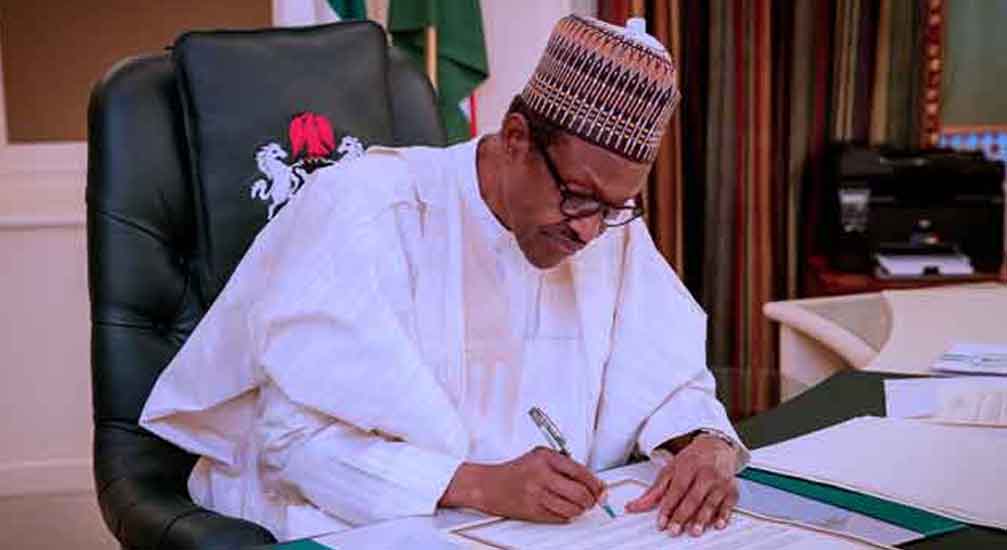Members of the National Assembly and some section of Nigerians have reacted as President Buhari has declined to assent to the electoral bill submitted to his office by the National assembly in the last month. According to the Nigerian constitution, a 30 days window is what is permissible for a democratically elected president to assent to any bill submitted for his consideration by the lawmakers, otherwise, it would be deemed declined. Therefore, a 30 days window has elapsed last night for the electoral bill submitted to President Buhari. As at the time of filing this report, there was no official statement from the presidency as to what happened to the much anticipated Electoral bill, dashing out the hope of the Senate President, Ahmed Lawan, and the Speaker House of Reps, Femi Gbajabiamila who earlier expressed confidence in President Buhari.
The Electoral Bill was submitted on the 19th November to President Buhari in line with the Nigerian constitution for his assent and which makes it 30 days yesterday.
Section 58 (4) of the 1999 Constitution says, “Where a bill is presented to the President for assent, he shall within 30 days thereof signify that he assents or that he withholds assent.”
Some sections of Civil Society and interest groups including the main opposition have frantically called on the President to assent to the bill, however, it emerged last week that the Attorney-General of the Federation (AGF) and Minister of Justice, Abubakar Malami (SAN), had written a letter to Buhari, highlighting the problems with the inclusion of mandatory direct primaries in the Electoral Act amendment bill.
He informed the president that making direct primaries mandatory for all political parties could cause confusion.
A source in the presidency hinted that the president will communicate to the leadership of the parliament today, where he is expected to raise reservation with clause 87, which provides for direct primary.
There has been a cold war between federal lawmakers and governors over the inclusion of direct primaries in the bill, with the latter mounting pressure on the president to reject the provision.
There is a call from some sections of Civil society ORganisations calling on the National Assembly to Veto the president and pass the bill.
Recalled a similar incident in June 2000, where the then National Assembly passed the Niger Delta Development Commission (NDDC) bill with over two-thirds majority, thus overriding President Olusegun Obasanjo’s veto.
Although, a source from the National Assembly said they are yet to receive any official communication from the presidency, however, he assured that even if it turns out that Buhari has refused to sign the bill, a decision would be taken by the lawmakers before they embark on the end of year recess.
He said, “For sometimes, there has been pressure that we should invoke the 2/3 rule as enshrined in the 1999 Constitution if the president fails to assent it. Discussions are on along this line but there are a lot of things that would be looked at before we can arrive at anything,”
Another lawmaker said, “He would not assent to it because he is being misled by people around him and he likes to hear that. They are doing this to cause confusion in the polity. It would be difficult for us to override the president’s veto because we cannot get the 2/3,”
However, Senator Kabiru Gaya (APC, Kano), expressed optimism that the Buhari will act on the bill.
Another senator, referring to state governors, said “They tried to lobby us to rescind our decision on direct primary but failed. They now transferred the pressure on the president to reject the bill.”
Rep Tanko Sununu (APC, Kebbi) while responding to questions on the matter said it was too early for him to make comments since the president was yet to communicate to House on whether he has assented or declined assent.
“For me, I won’t say the president has turned down assent or has assented because, there are formal channels of communication of which by Tuesday’s sitting, we should be able to know whether the president has assented or not.
CSOs calls for Override of President
The Executive Director, Civil Society Legislative Advocacy Centre (CISLAC), and also Coordinator, Transparency International (TI) in Nigeria, Auwal Musa Rafsanjani, said though the National Assembly members, as the representatives of people, have done well in passing the majority wish of the citizens to the president.
He explained that the onus now lay on the lawmakers to prove to Nigerians that they are not a rubber stamp, as being claimed by Senate President Ahmad Lawan, by overriding President Muhammadu Buhari’s veto.
Rafsanjani said, “The president’s interest should not override Nigerians’ and national interest. It is disheartening that the president who lamented that he was a victim of political corruption before the emerging president, has not sent any bill to the National Assembly to deepen democracy and is not keen on acting in the interest of tackling political corruption by signing the Electoral Amendment bill sent to him the National Assembly,”
In his contribution, the Convener, Good Governance Team (GGT), Mr. Tunde Salman, urged the National Assembly to override the presidential veto at least to pass a strong message that the current Assembly is not a rubber stamp legislature as widely believed.
Salman said, “I am not comfortable that the Attorney General of the Federation (AGF) would now be serving as a clearinghouse for bills passed by the National Assembly. Where was his office, when the amendments procedures were being considered, to make his inputs?”
On their part, a coalition of CSOs said that the president’s delay in signing the bill has created unpalatable suspense and generated avoidable apprehension, although his inaction may not be the final call after December 19.




















